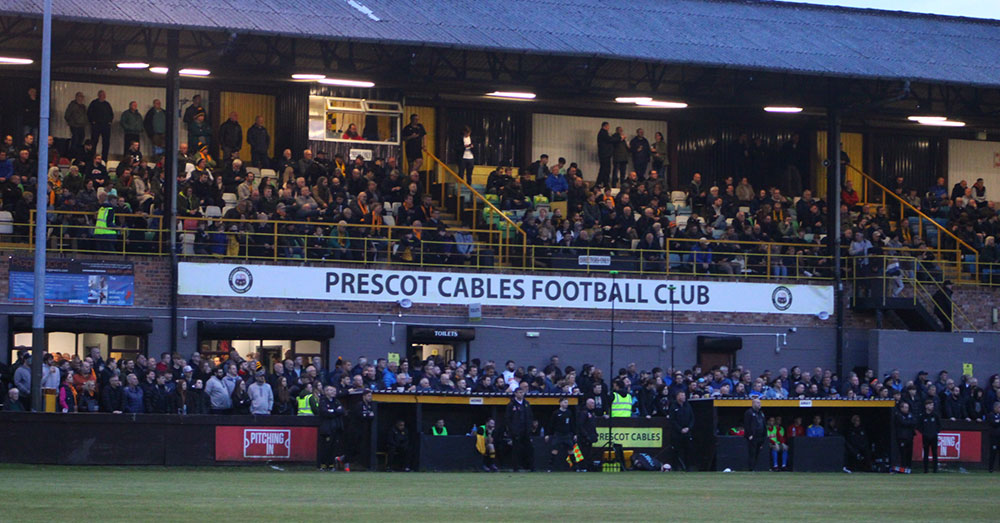So, a season’s work comes down to this. A local derby. A Cup tie against a local rival who have recorded their best-ever Step 4 season to reach this point. Horrible, isn’t it?
It is, of course, the best kind of ‘horrible’. As stomach-churning as the pre-match nerves are and as agonising as the match will be for Bulls and Bucks alike it’s great that Cables and Bootle still have a shot at promotion. In the old days, Saturday’s win at Trafford wouldn’t have been enough for Prescot and Runcorn Linnets would be celebrating their elevation to Step 3. As it is, with only three points separating the runners-up from tonight’s visitors and the fifth-placed club, City of Liverpool, only another two points behind, all of the sides involved could make a compelling argument for a place at the higher level.
Football fans tend to think of play-offs as a relatively recent phenomenon, but the concept is almost as old as League football. In the earliest days of the Football League, promotion and relegation weren’t automatic; instead, “Test Matches” took place involving the bottom three First Division clubs against the top three clubs in the Second Division. There were seedings – the Second Division Champions took on the bottom club in the First Division, and so on. Just like tonight’s match and Saturday’s Final, the Test Matches were one-off fixtures, not two-legged affairs. However, these games were played at neutral venues.
At the end of the 1892-93, the inaugural Second Division Champions, Small Heath (now Birmingham City) missed out on promotion after drawing with Newton Heath (now Manchester United) at Stoke, then losing a replay played at Sheffield Wednesday’s ground. However, runners-up Sheffield United and third-placed Darwen did go up, after beating Accrington and Notts County respectively. Accrington didn’t take their place in Division Two, however, as they couldn’t afford to play at the lower level and instead resigned their membership entirely.
Newton Heath finished last in the top flight again the following season but couldn’t repeat their win over Small Heath. The Mancunians were relegated after being beaten at Ewood Park, Blackburn by an upstart club by the name of Liverpool. Small Heath also made it to the First Division by beating Darwen but Notts County didn’t make an immediate return to the top table; they lost 4-0 to Preston North End.
At the end of the 1894-95 season, Liverpool found themselves back in the second tier, after they lost their Test Match against Bury. Notts County and Newton Heath were again on the losing side of Test Matches, being defeated by Derby County and Stoke respectively.
The following season saw a change to the Test Match programme. The number of clubs involved was reduced to four – the bottom two clubs in Division One and the top two in Division Two. Unlike modern play-offs, a round-robin format was used, with the top two teams being elected to the First Division. Each club played home and away against the two clubs from the opposite division, but not against the club they had faced during the regular season. For example, in the first season of this format, Second Division Champions Liverpool played Small Heath and West Bromwich Albion and beat both at Anfield, which helped to secure a place in the top tier. They did not play Manchester City, who had been runners-up to the Reds in the main League table but finished bottom of the Test Matches table.
This rather strange programme of matches lasted for three seasons before a match between Stoke and Burnley on 30th April 1898 produced a convenient outcome for both clubs, who went into the game at the Victoria Ground knowing that a draw would see both finish in the top two places in the table. The fixture duly ended 0-0 and the Athletic News reported, “The teams could have done without goalkeepers, so anxious were the forwards not to score”. The immediate effect of the scandal was for the Football League to expand the First Division to eighteen clubs, including all four clubs involved in that year’s Test Matches, before abandoning the “unsatisfactory” method in favour of “promotion by merit”; an idea first proposed by Grimsby Town a year earlier.
Fast forward back to tonight, where four local rivals will come together to compete for a single promotion place. The modern play-off format is designed to reward – at least to some extent – the clubs who perform best during the League campaign by awarding home advantage to the highest-ranked team. Of course, this offers no guarantees of success to the clubs hosting any given match and, let’s be honest, having to play away from home twice is unlikely to phase the nomadic City of Liverpool as they attempt to bring Step 3 football to… Cheshire. But playing in familiar surroundings and with a large crowd backing them can only be a benefit to most clubs and playing the semi-finals in midweek will help clubs whose opposition have to make a long, arduous journey on a working day.
That’s what makes tonight’s match – along with the other semi-final in our Division – unique. I’m not sure there’s ever been a scenario where the four clubs competing within the play-offs are so close together, both in terms of geography and their results against each other. Whatever happens over the three matches that determine who joins Leek Town in the Northern Premier League Premier Division next season, it’s going to be gut-wrenching, nerve-shredding and unbearably tense.
And I can’t wait. Come on Cables!
